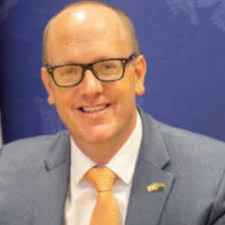Search NaijaAgroNet
Friday, January 23, 2026
Silent Hunger: Malnutrition threatens 1m children in North-East as Nigeria seeks $516M aid - NaijaAgroNet
A looming catastrophe of child malnutrition threatens Nigeria's North-East, with a staggering 1 million children in Borno, Adamawa, and Yobe (BAY) states projected to be at risk in 2026, reports NaijaAgroNet.
This dire forecast comes as the Nigerian government, alongside humanitarian partners, launches an urgent appeal for $516 million to provide critical support to 2.5 million people in the conflict-affected region.
Monday, January 19, 2026
Nigeria witnesses bumper plantain harvest as prices dip, farmers eye processing boom - NaijaAgroNet
A surge in plantain harvests across Southern Nigeria is reshaping local food markets, as farmers, traders and processors respond to what many describe as the most abundant plantain season in recent years, reports NaijaAgroNet.
Monday, December 15, 2025
Afrimash charts digital path for Nigeria’s food security @Oyo 2025 Agribusiness Summit - NaijaAgroNet
The recently concluded Oyo 2025 Agribusiness Summit underscored the critical role of technology in achieving national food security, with Afrimash, the Ibadan-based agritech firm, emerging as a central figure in the discourse, reports NaijaAgroNet.
Thursday, November 27, 2025
The Green Guardians of Nigeria by Remmy Nweke - eStoryBook@NaijaAgroNet
Friday, November 21, 2025
DG NESREA on circular economy: Nigeria must position itself as a key player - NaijaAgroNet
Nigeria's spiraling electronic waste problem has reached a critical juncture, demanding immediate, unified national action from all stakeholders, from top regulators to individual digital citizens.
Sunday, November 2, 2025
Sunday Jackson: Justice, agriculture, and cost of survival in rural Nigeria by Remmy Nweke - WeekendSalvo@NaijaAgroNet
Foreword:
Saturday, November 1, 2025
Economy of GMO adoption in Nigeria: Risks, monopolies and farmer livelihoods by Remmy Nweke - WeekendSalvo@NaijaAgroNet
This WeekendSalvo@NaijaAgroNet by REMMY NWEKE, examines Nigeria’s GMO economy, exploring its promises, policy gaps, and impact on smallholder farmers, while calling for innovation rooted in fairness, food sovereignty, and inclusive agricultural growth.
Framing the debate:
In the evolving narrative of agricultural innovation, Genetically Modified Organisms (GMOs) have become both a beacon of promise and a source of contention.
Monday, October 6, 2025
Dangote reaffirms commitment to Nigeria’s progress, workers’ welfare - NaijaAgroNet
The Dangote Petroleum Refinery has reaffirmed its unwavering commitment to Nigeria’s economic progress, workers’ welfare, and industrial stability, while commending President Bola Ahmed Tinubu for his timely intervention in averting what it described as “the disruptive actions of PENGASSAN” against the company.
Monday, September 22, 2025
Nigeria takes step forward in food security with solar-powered irrigation - ITREALMS
The National Agency for Science and Engineering Infrastructure (NASENI) welcomes the endorsement of its solar-powered irrigation pumps by the National Economic Council (NEC) for nationwide rollout ahead of the 2025 dry-season farming, reports NaijaAgroNet.This landmark decision, taken at NEC’s 152nd meeting held at the Presidential Villa, Abuja on Thursday underscores the Council’s confidence in NASENI’s capacity to deliver homegrown, energy-efficient solutions that directly respond to Nigeria’s food security challenges.
Nigeria's Catholic bishops warn against unregulated GMOs - NaijaAgroNet
The Catholic Bishops' Conference of Nigeria (CBCN) has expressed concerns about genetically modified organisms (GMOs), urging the government to regulate their production, reports NaijaAgroNet.

Thursday, September 18, 2025
WFP welcomes donor contributions to save lives in north east Nigeria - NaijaAgroNet
The United Nations World Food Programme (WFP) welcomes recent contributions from donors since warning that operations would be forced to shut down in July, reports NaijaAgroNet.
Saturday, September 13, 2025
Climate Change and Nigeria: Farmers at frontline by Remmy Nweke - WeekendSalvo@NaijaAgroNet
Friday, September 5, 2025
Nigeria: Why UN plastic treaty matters by Remmy Nweke
Look around any Nigerian city or village, and you will see a constant presence: plastic. From sachet water bags to discarded food wrappers, this waste has become a familiar, and damaging feature of our landscape.The global push for a UN plastic treaty has profound implications for Nigeria. REMMY NWEKE in this WeekendSalvo@NaijaAgroNet details how the nation’s pervasive plastic waste threatens food security and livelihoods, while arguing that this global crossroads presents a golden opportunity for Nigeria to embrace a circular economy and build a more sustainable future.
Tuesday, August 19, 2025
Nigeria’s clean energy future sails into view with new LPG vessel - NaijaAgroNet
Nigeria’s commitment to providing clean and sustainable energy solutions for both itself and the African continent has been bolstered by the commissioning of a new 40,000 cubic meters (CBM) Liquefied Petroleum Gas (LPG) vessel, the MT Iyaloja (Lagos), reports NaijaAgroNet.
Monday, August 18, 2025
New blueprint for Nigeria's nutrition future - NaijaAgroNet
In a landmark meeting that reaffirmed a decade of partnership and a shared vision for a healthier Nigeria, key stakeholders gathered at the 2025 Gates Foundation Partner Advisory Committee (PAC) meeting in Abuja.
The forum, which brought together leaders in health, agriculture, and government, concluded with a renewed commitment to tackling the nation’s multifaceted challenges, with nutrition at the forefront.
Wednesday, August 6, 2025
Nigeria's Alarming Malnutrition Crisis: Why Death Toll Exceeds War-Torn Palestine by Elvis Eromosele - NaijaAgroNet
At the end of July 2025, the world was shocked to learn that 169 people, including 93 children, had died of malnutrition in Palestine since the outbreak of the devastating war with Israel. For context, the war has gone on actively for close to two years. Tragic and painful as this figure is, it is utterly dwarfed by a chilling statistic from Nigeria: over 652 children have died from malnutrition in Katsina State alone, and that’s just in the first half of 2025.
This jarring incongruity provokes a bleak and sobering question: How can a nation not technically in war end up outpacing a war zone in deaths due to hunger and malnutrition?
Saturday, August 2, 2025
GMOs: Game-changer for Nigeria's food security? Asks Remmy Nweke
Preamble:REMMY NWEKE in a new edition of WeekendSalvo@NaijaAgroNet, explores the potential of genetically modified organisms (GMOs) and asked if it’s a game-changer for Nigeria's food security.
Saturday, May 11, 2024
Taxes, royalties: Shell Nigeria paid $1.09bn in 2023 - NaijaAgroNet
The Federal Government of Nigeria (FGN) received in taxes and royalties the total sum of $1.09 billion, about N2,707,310,000,000.00 trillion, as at December 2023 through the operations of The Shell Petroleum Development Company of Nigeria Ltd (SPDC) and Shell Nigeria Exploration and Production Company of Nigeria Ltd (SNEPCo.) in the country, reports NaijaAgroNet.Sources close the Shell Nigeria, disclosed that the figures, recently published in the 2023 Shell Briefing Notes, showed that SPDC paid $442 million, while SNEPCo remitted $649 million.
Friday, May 3, 2024
Food security: How tech can tackle challenges in Nigeria - NaijaAgroNet
Nigeria's agricultural sector has long been a significant contributor to national growth, with the potential to further reduce poverty. This sector, encompassing crop production, livestock, forestry, and fishing, has the potential to hold export opportunities and can strategically become the engine for economic prosperity, given Nigeria's large population.
Wednesday, May 1, 2024
Why we launched Nigeria food security strategy says Stevens - NaijaAgroNet
The Consul-General of the United States of America (USA) to Nigeria, Mr. Will Stevens has given some reasons why they recently launched the Nigeria food security strategy, reports NaijaAgroNet. “Last month, alongside our partners in the Nigerian agricultural value chain, we launched the U.S. government’s Global Food Security Strategy Country Plan for Nigeria that aims to boost agriculture productivity and drive agriculture-led economic growth,” he declared.



.png)
















